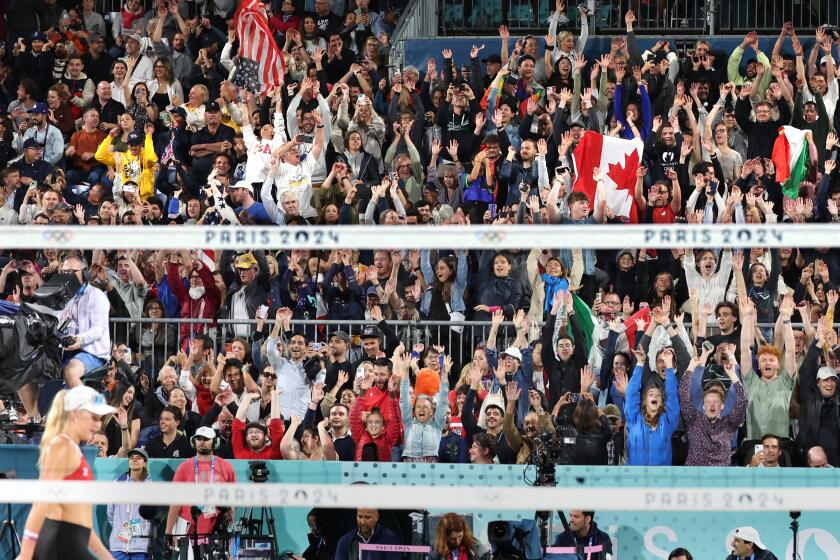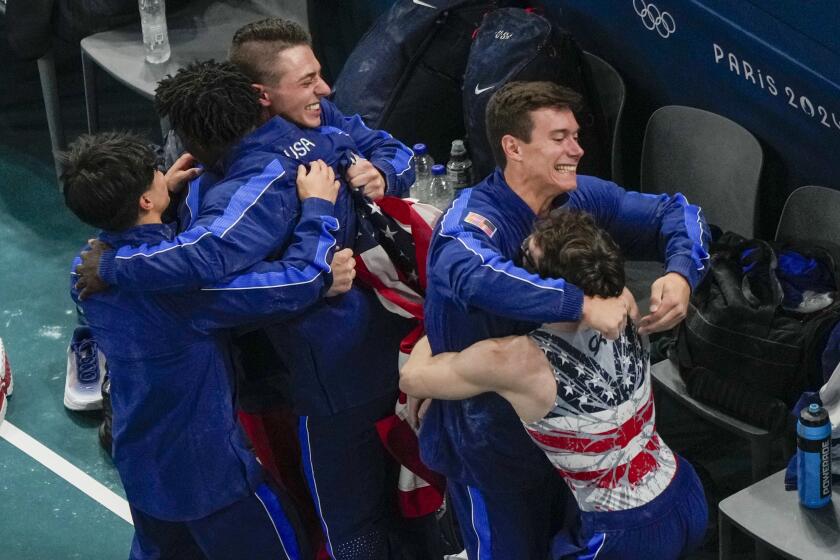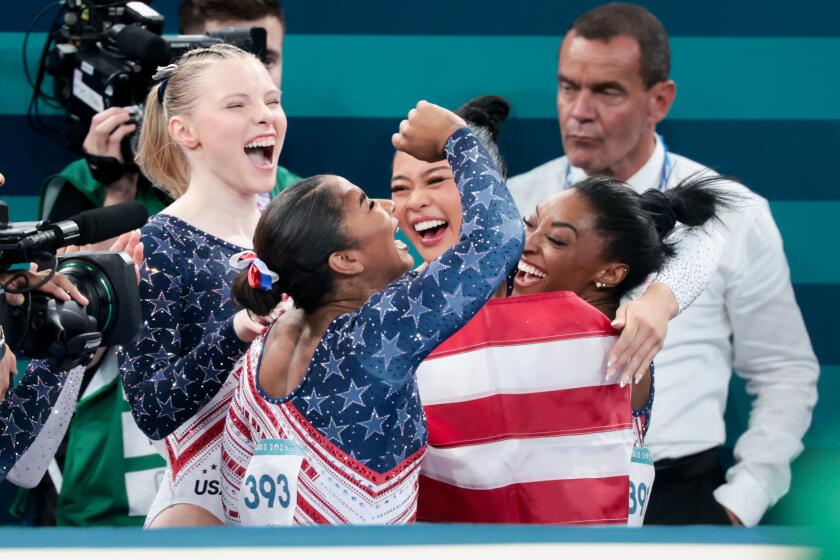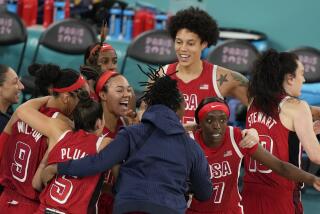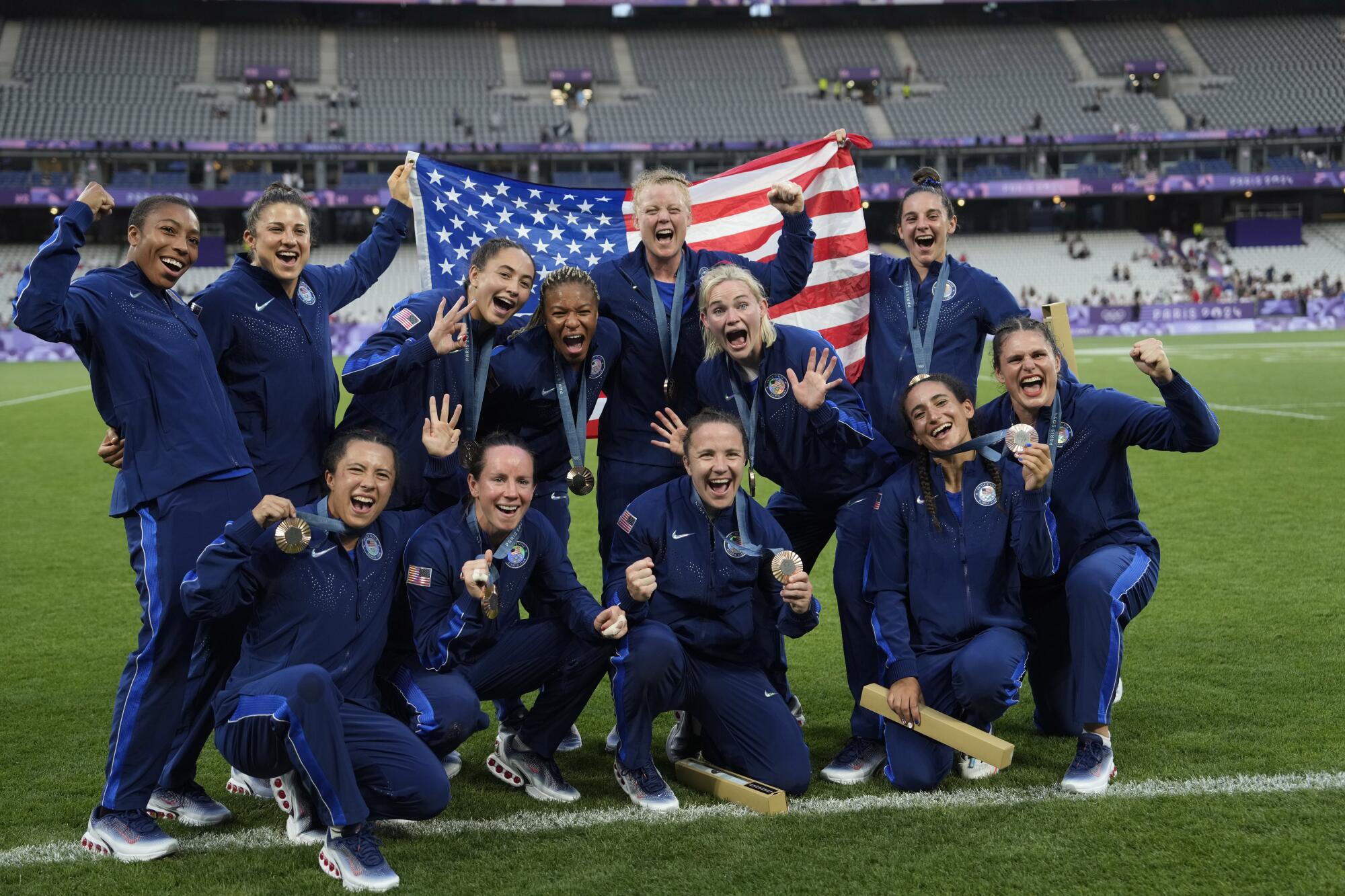
- Share via
PARIS — Every four years the world pauses for two weeks to cheer on rowers, fencers, archers and weightlifters, who win and lose in anonymity for most of their careers.
But one moment of brilliance during that narrow window can change the trajectory of a sport or an athlete forever. Think Nadia Comaneci on the balance beam, Dick Fosbury flopping to victory in the high jump or Shun Fujimoto sticking his dismount from rings on a shattered knee.
For the U.S. women’s rugby sevens team, that moment may have come Tuesday at a sold-out Stade de France stadium when replacement Spiff Sedrick burst out of a crowd of defenders and raced nearly 100 yards as time expired to tie the score. She then added the two-point conversion, giving the Americans a stunning 14-12 win over Australia and their first-ever Olympic medal, a bronze.
“We just made history,” teammate Ariana Ramsey said. “We just beat the second-best team in the world. That’s insane. It’s groundbreaking. Everything about this game was groundbreaking.
“It makes it an even bigger story.”
But the Paris Games haven’t been a coming-out party just for the U.S. team. Rugby sevens are often looked at as the ignored outcast of the rugby union, whose World Cup is arguably the third-largest sporting competition on the planet behind the Olympics and soccer’s World Cup.
It’s faster and the games are shorter, which is why it appealed to the International Olympic Committee. But the sport struggled to catch on in the Olympics. It was added to the calendar for the 2016 Rio Games, where it was played in a small, temporary venue and got scant attention. Five years later in Tokyo, the COVID-19 pandemic kept even those few fans away.
In France, however, the men’s and women’s tournaments combined to draw more than 550,000 spectators over six days. The crowd of 66,000 for the women’s first match day was a world record for rugby sevens.
“We had a humble beginning in Rio, a really challenging Tokyo,” said Alan Gilpin, World Rugby’s chief executive. “We worked really hard over the last year to get to the point where the product is brilliant. That has started to come to fruition here.”
After two Olympics were played under COVD-19 restrictions, fans are showing up to the Paris Olympics, much to the delight of athletes and organizers.
For U.S. rugby, Tuesday’s medal, and the highlight-reel way in which it was won, could have a similar effect as the country prepares to host the 2028 Olympics and the rugby World Cup in 2031.
“It’s really huge,” coach Emilie Bydwell said. “I don’t even know if it’s fully soaked in. To beat one of the best teams in the world, to do it in such an exciting fashion, to have that much belief and resilience. That’s got to be one of the best moments in the Olympics so far.
“We’re an emerging sport in our country and we just won a medal,” she continued. “How competitive can we be? I hope that we just got so many more people watching it and excited about it.”
It’s already happening. Less than two hours after the Olympic tournament concluded, USA Rugby announced an unprecedented $4-million donation over the next Olympic cycle from Michele Kang, owner of women’s soccer clubs in the U.S., France and England.
Yet it was all just seconds away from never happening, and the U.S. required good luck, as well as good timing, to pull it off.
First Australia’s Maddison Levi scored to break a 7-7 tie with less than 1½ minutes to play; when Tia Hinds missed her kick on the conversion attempt, it seemed of little consequence.
It would soon prove to be massive.
Australia kicked off and quickly pinned the desperate Americans in the shadow of their own goal line before Sedrick emerged from a pile of bodies with nothing but grass in front of her.
A significant strategy change put the U.S. men’s gymnastics team in position to clinch a team bronze medal during the Paris Olympics on Monday.
“All I remember is her getting the ball. There were like four girls on her,” Ramsey said.
Sedrick wasn’t sure what had happened. But she knew she had to run.
“Honestly, I was really surprised,” she said. “Australia has a very clinical defense, and I know any time I break the line, all of them are going to be chasing [me].”
Before she crossed the goal line, time had expired and Sedrick thought the Americans had won. In reality, the score was tied. They had 30 seconds to make the conversion.
“We’re all celebrating,” she said. “And then I was like, ‘Oh, I have to kick it.’”
Because of Bydwell’s substitutions, Sedrick, who rates herself no better than fifth-best on the team at kicking, would have to do that too. And she wasn’t exactly confident after shanking both her tries in warmups.
“Luckily it went in,” said Sedrick, who made the kick with seven seconds to spare. “I was really surprised.”
New Zealand beat Canada 19-12 in the gold-medal final of the three-day tournament, which drew more than 180,000 fans. And that had Bydwell wondering if the people organizing the 2028 Games in Los Angeles might want to move rugby from 27,000-seat Dignity Health Sports Park, where it’s scheduled to be played.
Simone Biles, Jordan Chiles, Suni Lee and Jade Carey rebounded from finishing second in Tokyo, winning gold in Olympic gymnastics team competition.
Once people sample the sport, she said, they’ll find out Tuesday’s bronze-medal match wasn’t only an exciting game, but a typical one as well.
“Sevens is like that. It’s crazy,” she said. “It comes down to the wire. What the American public should know is we play seven or eight tournaments a year and you get this level of competition. It’s this exciting all the time.
“I just hope people can start to see how hard it is, how fun it is to watch, how exciting and exhilarating it can be because of what they just saw.”
Maybe the Rose Bowl is available.
For the record:
1:31 a.m. Aug. 1, 2024An earlier version of this story stated Australia’s Teagan Levi scored to break a 7-7 tie. It was her sister, Maddison.
More to Read
Go beyond the scoreboard
Get the latest on L.A.'s teams in the daily Sports Report newsletter.
You may occasionally receive promotional content from the Los Angeles Times.

